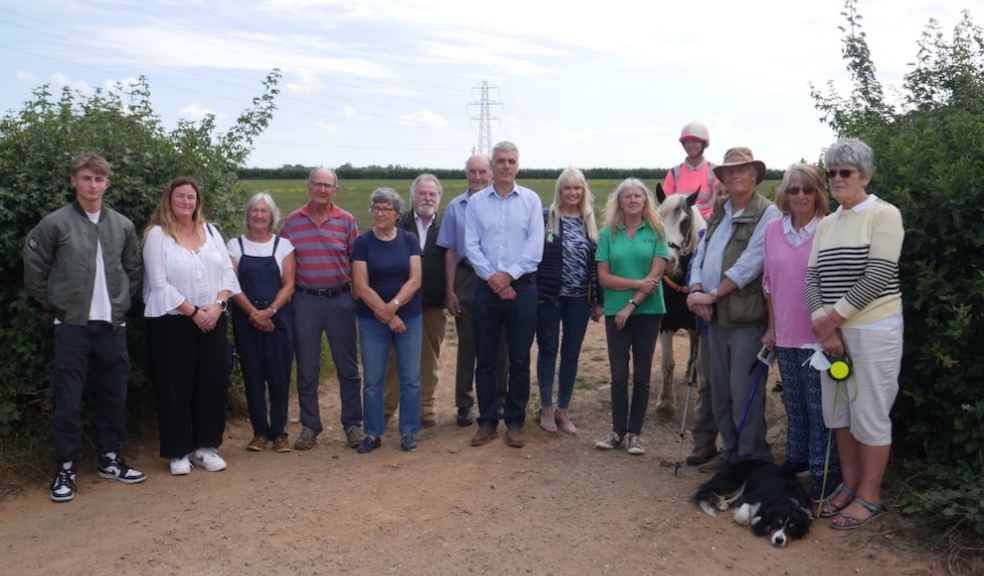
East Devon residents call on Devon CPRE to help them fight solar on farmland
Villagers of Marsh Green in East Devon have made an urgent appeal to the Devon branch of the countryside charity CPRE to help them fight an alarming planning application for a solar farm that would destroy hundreds of acres of productive land and increase the risk of their homes flooding. The extraordinary proposal also includes cutting off the nearby hamlet of Westcott for five days a week during the construction phase to make it easier for heavy goods vehicles to gain access.
The small rural communities of Marsh Green and Westcott are among the many in East Devon, Mid Devon and Torridge currently threatened by large solar developments, each the size of an average farm. The Marsh Green objectors have already erected a huge sign opposite one of the fields under threat. They say they are not anti-solar but will fight East Devon District Council tooth and nail to stop consent from being granted on agricultural land. Not far away, Horton Solar Farm is proposed on land east of Rutton Farm at Whimple, and there are several others in the system.
East Devon District Council recently approved a similar application at Clyst Hydon following a 3-hour debate. Last week, the Planning Committee voted by ten votes to two to allow a solar farm on agricultural land at Peradon Farm, despite 344 objections from the local community, including three parish councils. Two councillors tried to get the decision deferred until the council has a proper solar strategy in place and fully understands the impact of all the current applications. The developer admitted that some letters in support of the solar farm, penned in the names of local people, had actually been written and sent from their office in Sheffield. The developer also admitted that a tab on their website automatically generated a letter to EDDC in support of the application by anyone who clicked it.
Devon CPRE Director Penny Mills recently met with objectors at Marsh Green, who showed her the proposed development site spread around their village over several fields south of the A30.
Penny said, “Why aren’t our local planning authorities being proactive, ensuring they have policies in place to protect the countryside? And why aren’t they listening to the commonsense arguments of local people about the need for greater food security? 100% of the proposed development site at Marsh Green is Best and Most Versatile (BMV) farmland. It’s an absolute travesty to cover it in 60,000 glass panels and everything else that comes with it.”
She added, “People here are not anti-solar, but they have real concerns about the increased flood risk to their properties: it’s called Marsh Green for a reason! We all keep trying to make planners see sense, but what can we do to stop the rich out-of-town developers from spoiling Devon if our local planning authorities don't listen?”
Members of the newly-established Marsh Green Valley Protection Group agree. This is what they have to say:
Paul Jefferson, Chair of Marsh Green Valley Protection Group: “This proposal removes the best and most valuable farmland from producing food for the country and that conflicts with Government policy. It increases the flood risk within our rural community and the development site is immediately on the outskirts of a small village, very close to homes. The local highway infrastructure can’t sustain the HGVs and the number of loads needed during construction. We, as a community, are not against small solar farms, and there are others in the area, but the scale, size and location of this scheme are completely inappropriate.”
Ron Forrest, Vice Chair of Rockbeare Parish Council, lives in nearby Westcott: “It’s a beautiful valley with good productive land, and they’re planning to take it out to cover it with solar panels. I am not anti-solar, but this is not the right place for it. And then there are massive access problems. They want to shut down the hamlet of Westcott five days a week from 8 am until the evening for a year or more! How are people supposed to get to work, to the doctor or get their kids to school?”
Julian Turnbull: “My concerns are on planning matters, the increased risk of flooding in Marsh Green and also the Planning Statement submitted by the developers is misleading and incomplete in terms of the construction highways plan.”
Dorf Ruscoe: “We have solar panels on the roof of our house, so I am not against solar. What I am very concerned and angry about is that we have the new town of Cranbrook four or five miles from here. I don’t know how many houses have been built there in recent years and there’s hardly a solar panel on a roof. Developers should be told that any new buildings must be fitted with solar panels. Instead, we are sacrificing good land unnecessarily.”
Tobias Nequest, 18 years: “I’m not against solar, but it should be food first. As it says on our sign ‘Grass not Glass’. With the crisis in Ukraine, we need every field to produce food. I’ve recently joined the Army and I’m not fighting for a field full of grass. I’m fighting for food for my family at home. There are other ways to produce renewable electricity, but we have to eat.”
Cyril Emmett: “Governments never see their folly until it’s too late. What’s the point of saving the planet while starving the people? Food security must be prioritised.”
Devon CPRE is awaiting replies from East Devon’s MP, Simon Jupp, and Minister George Eustice from whom the charity is seeking clarification on a number of points raised by the Peradon Farm decision.











